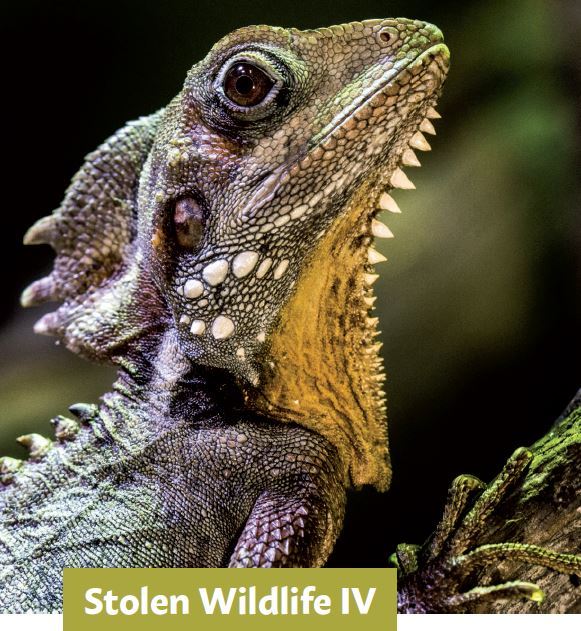EU continues to be a major destination for stolen wildlife
EU continues to be a major destination for stolen wildlife

Animal protection groups release new report urging legal loopholes to be closed
Brussels, Munich, 27 September 2022 – The European Union continues to be a main hub and destination for wildlife, which has been ‘stolen’ from Latin America, Africa, the Middle East, Asia and Oceania, a new report released today by Pro Wildlife, Humane Society International and IFAW reveals. Stolen Wildlife: The EU – a destination for wildlife traffickers exposes European complicity in this illegal trade, with EU citizens not only being involved in the smuggling of nationally protected wildlife, but also perpetuating the market for these animals.
The European Union is one of the biggest importers of animals destined for the exotic pet trade. Only a very small fraction of the species in this trade are actually covered by international and/or EU legislation. However, many species in trade, which are protected in non-EU countries under domestic legislation, have nonetheless been caught in the wild and exported in violation of the country of origin’s national law, such as the impressive Philippine sailfin lizard or the unique glass frogs from Latin America.
Dr Sandra Altherr, Head of Science at Pro Wildlife, says:
“In their quest to own unique wild animals, wealthy exotic pet keepers in Europe are driving the global trafficking of rare species. Wildlife smugglers are openly selling illegally acquired animals at European trade shows in the full knowledge that they can get away with it because of the loopholes in the EU legislation. With each rare lizard fetching up to thousands of Euros, big money can be made with virtually no legal risks.”
Ilaria Silvestre, Head of EU Policy & Campaigns at IFAW, adds:
“The Internet is a major channel for directly connecting traders and clients from all over the world. It is the ideal platform for criminal animal traders. The online trafficking of protected species, which is partly fueled by the promotion of exotic pet ownership and interactions on social media, poses a huge challenge for enforcement authorities. Illegal wildlife trade, both online and in physical markets, is increasingly targeting rare wild species that are not protected by the EU legislation, and this is a contributor to the catastrophic biodiversity loss seen globally.”
Dr Joanna Swabe, Senior Director of Public Affairs for Humane Society International/Europe, notes:
“It is time for the EU to act. It must turn its good words in its recent Biodiversity Strategy to 2030 about halting global biodiversity loss into concrete deeds. The European Commission is due to soon deliver its revised Action Plan Against Wildlife Trafficking. This is a golden opportunity for them to tackle this form of illegal wildlife trade and to start developing supplementary legislation to criminalise the trade in wildlife that has been taken in violation of other country’s laws.”
Stolen Wildlife: The EU – a destination for wildlife traffickers not only provides detailed case studies from Cuba, Brazil, Morocco, South Africa and the Philippines, but also gives an overview of the attempts made by range states to protect their unique biodiversity. For example, by recently tabling several proposals for the upcoming CITES Conference of Parties meeting in Panama to restrict the international trade in their endemic species.
The three animal and wildlife protection organisations are calling for EU legislative action to introduce a law, which prohibits the import, sale, purchase and possession of wildlife that has been illegally sourced in its country of origin. This demand has also been repeatedly backed by the European Parliament over the past few years, in several adopted Resolutions that urge the European Commission to deliver such legislation.
Media contacts:
Dr. Sandra Altherr, Pro Wildlife, +49 174 217 5054, Sandra.altherr@prowildlife.de
Yavor Gechev, Humane Society International/Europe, +359889468098, ygechev@hsi.org
Benjamin Wiacek, IFAW, +32 2 237 60 55 or +32 472 17 15 81, bwiacek@ifaw.org
About Pro Wildlife
Pro Wildlife is a non-profit organisation that works worldwide to protect wildlife and their habitats. Our goal is to preserve biodiversity and save animals. In doing so, the survival of the species in their habitat, but also the protection of the individual animal is important to us. We advocate for better laws and effective protection measures for wildlife. In various countries, we support aid projects for animals in need, help to preserve habitats and work to ensure co-existence between people and wild animals.
About Humane Society International/Europe
Advancing the welfare of animals in more than 50 countries, Humane Society International works around the globe to promote the human-animal bond, rescue and protect dogs and cats, improve farm animal welfare, protect wildlife, promote animal-free testing and research, respond to natural disasters and confront cruelty to animals in all its forms.
About the International Fund for Animal Welfare (IFAW)
The International Fund for Animal Welfare is a global non-profit helping animals and people thrive together. We are experts and everyday people, working across seas, oceans and in more than 40 countries around the world. We rescue, rehabilitate and release animals, and we restore and protect their natural habitats. The problems we’re up against are urgent and complicated. To solve them, we match fresh thinking with bold action. We partner with local communities, governments, non-governmental organisations and businesses. Together, we pioneer new and innovative ways to help all species flourish. See how at ifaw.org
Related content
Every problem has a solution, every solution needs support.
The problems we face are urgent, complicated and resistant to change. Real solutions demand creativity, hard work and involvement from people like you.